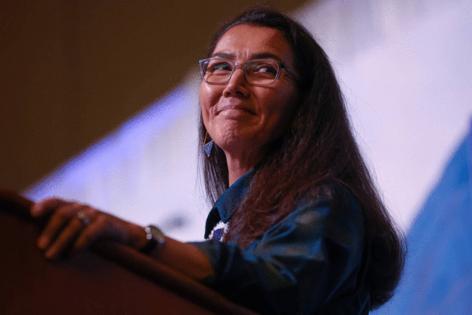A week to go: A third-party U.S. House candidate gets a boost, early Alaska voting on track to break record and Dunleavy rallies for Trump
Published in News & Features
ANCHORAGE, Alaska — With a week to go until Election Day, here's a roundup of voting-related news.
A Political Action Committee called Vote Alaska Before Party is boosting a third-party candidate in Alaska's congressional race, following advice from national Democratic operatives who see the strategy as favorable to Democratic incumbent Rep. Mary Peltola.
The PAC is sponsoring ads that call on voters to cast their ballots for John Wayne Howe, chair of the Alaskan Independence Party. Howe, who is running on a platform of opposing most aspects of the federal government, received 621 votes in the primary and has reported no campaign fundraising or spending of his own.
The ads from Vote Alaska Before Party, a PAC supporting Peltola, also attack Republican Nick Begich, Peltola's main challenger for Alaska's lone U.S. House seat.
The Democratic Congressional Campaign Committee stated earlier this month that Republican "white men under the age of 60 without a college degree" should be targeted with ads that state that Howe "is running for Congress to keep Alaska for Alaskans and make sure the government does not interfere with Alaskans' freedoms."
Getting Republican voters to cast their ballots for Howe could weaken Begich, and in turn boost Peltola's candidacy, according to the strategy laid out by the DCCC.
Jim Lottsfeldt, an Anchorage-based political consultant advising the Vote Alaska Before Party PAC, declined to comment on the ads supporting Howe. Vote Alaska Before Party has reported spending nearly $6.5 million on the election so far opposing Begich, including an ad-buy of nearly $1.4 million made Monday.
The National Republican Congressional Committee is also pursuing a strategy of promoting unpopular candidates at the expense of the frontrunners.
The NRCC stated earlier this month that "Liberal Democrats with a college degree under 35 in urban and suburban Anchorage and Juneau need to hear that Democrat Eric Hafner supports Medicare for All and Defunding ICE on digital, streaming audio, texts, and in mailboxes."
Hafner is a registered Democrat who is running for Alaska's congressional seat despite being incarcerated at a federal prison in New York City. Hafner has never visited or resided in Alaska. He received fewer than 500 votes in the primary.
Begich himself has suggested during an interview with Kelly Tshibaka, a podcast host and chair of Trump's Alaska campaign, that Democrats in Alaska should vote for Hafner if they seek a candidate who has endorsed Harris. Peltola has declined to make an endorsement in the presidential election.
The Congressional Leadership Fund, which supports GOP candidates, reported spending more than $3 million attacking Peltola and more than $1,000,000 supporting Begich this month alone. The group is one of several political action committees trying to bridge the fundraising gap between Peltola and Begich.
Peltola's campaign has reported raising more than $11 million this cycle, making it the 11th highest grossing U.S. House campaign this cycle. Her spending of $10.9 million earned her a ranking of 9th among U.S. House candidates.
Begich, meanwhile, has reported raising only $2 million since launching his campaign.
'Historic' early voting
With just over a week remaining until Election Day, 29,445 Alaskans had cast early votes as of Sunday, according to information provided Monday by the Division of Elections.
Of the early votes cast, 36% came from registered Republicans; 15% came from registered Democrats; and 46% came from nonpartisan or undeclared voters. Republicans and Democrats are both overrepresented among early voters compared to their share of the electorate.
Of Alaska's nearly 610,000 registered voters, 12% are registered Democrats and 24% are registered Republicans. Nearly 59% are undeclared or nonpartisan.
Early voting is heavily skewed geographically. For example, more than 4,600 people from the four House districts covering the Kenai Peninsula have cast early ballots so far. Meanwhile, only 140 early ballots came from voters in four rural House districts covering the Aleutian Chain, Western Alaska, the Northwest Arctic and the North Slope.
The number of early voting locations is relatively limited. There are two in Anchorage, two in Juneau, and one each in Eagle River, Palmer, Wasilla, Fairbanks, Homer, Kenai, Soldotna and Nome. In early voting locations, a voter's eligibility can be determined immediately.
In dozens of other locations around the state, voters can cast absentee in-person ballots, meaning the ballots will be collected and reviewed by the Division of Elections in a similar manner to those delivered by mail. Those ballots are tallied separately from early votes.
The U.S. Postal Service recommends that voters planning to cast their ballot by mail do so by Tuesday, a week before Election Day.
The Division of Elections said in a statement on Friday that participation in the election so far is at a "historic level." More than 53,000 people cast early votes during the 2020 election.
Dunleavy attends New York Trump rally
Alaska's Republican Gov. Mike Dunleavy appears to have attended a rally for former President Donald Trump in New York on Sunday, according to photos posted from the event on social media.
The rally drew headlines for crude and racist insults made by speakers at the Madison Square Garden Events.
Pictures online showed Dunleavy at the venue, along with former Alaska Gov. Sarah Palin, also a Republican.
Dunleavy's spokespeople did not immediately respond to questions about the governor's schedule or his position on the controversial remarks made during the rally.
The Northern Journal previously reported that Dunleavy attended a Trump fundraiser in Texas earlier this month. Dunleavy was also seated with the Republican presidential nominee at the Republican National Convention in July.
©2024 Anchorage Daily News. Visit at adn.com. Distributed by Tribune Content Agency, LLC.







Comments